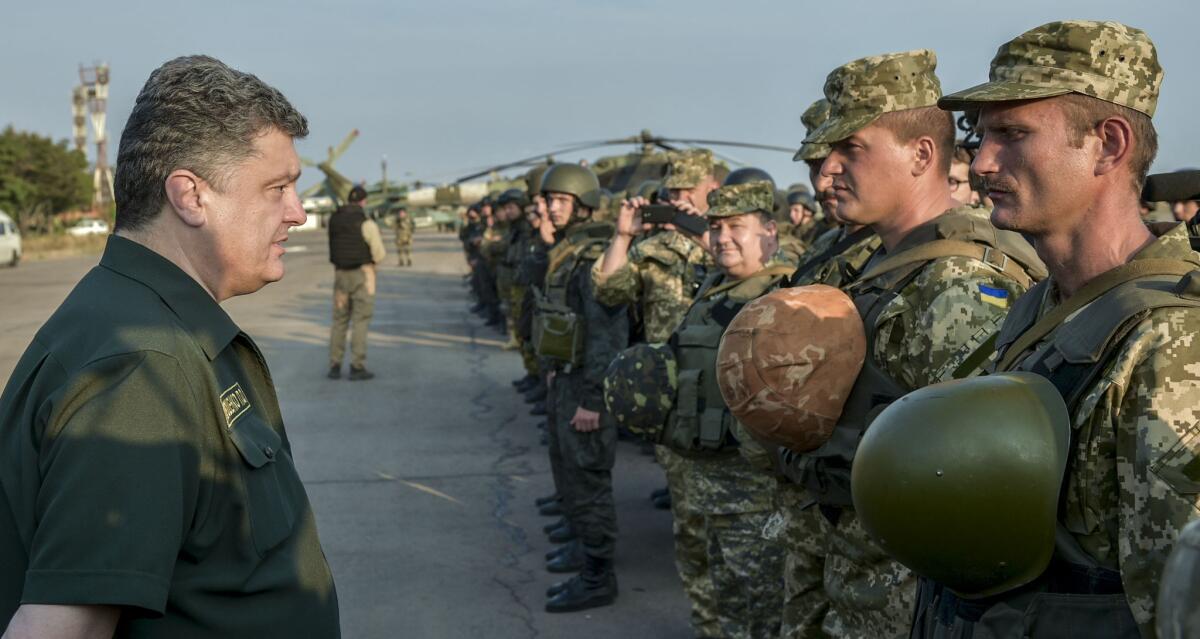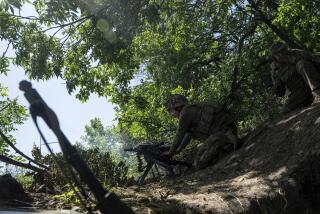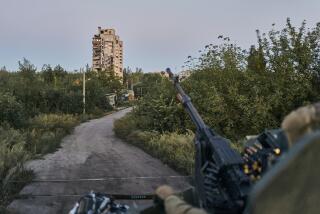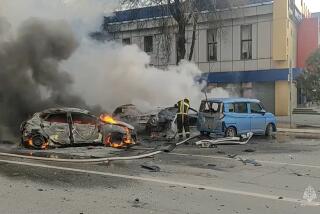Mariupol will never be ceded to Russia, Ukraine’s president says

Ukrainian President Petro Poroshenko visited troops and steelworkers in the frontline city of Mariupol on Monday and vowed that the strategic port in the gun sights of pro-Russia separatists would never be ceded to Russia.
In a defiant speech at the Ilyich Iron and Steel Works, the president warned that the 5-month-old conflict is far from over and ordered government troops to shore up their defenses around the city of 500,000.
Although major fighting has mostly subsided since the government and separatist leaders agreed to a cease-fire Friday, a Ukrainian military spokesman in Kiev, Col. Andriy Lysenko, said the pro-Russia gunmen had violated it at least five times over the weekend.
“We will do our best to achieve peace but we will be getting ready to defend our country,” Poroshenko told the hard-hat audience in remarks carried on national television. “As the commander in chief of the armed forces I have given full orders to strengthen the defenses of Mariupol.”
Poroshenko commended the military for halting the advance of Russian tanks on Mariupol that began two weeks ago. He accused Russia of carrying out “a full-scale invasion” when two columns of Kremlin armor and troops entered southeastern Ukraine along the Sea of Azov and rolled across the town of Novoazovsk before opening an artillery barrage against Mariupol.
Mariupol is a major heavy industry center in eastern Ukraine and, after the loss of Crimea to Russia this year, provides a vital outlet to the Black and Mediterranean seas. The Russian armored intervention has stirred fears among Ukrainians that Russian President Vladimir Putin is seeking to conquer the entire seaside corridor to provide a land bridge between mainland Russia and Crimea, which the Kremlin annexed in March.
The cease-fire brokered last week by the Organization for Security and Cooperation in Europe provides for convening peace talks for a permanent resolution of the Ukraine crisis. Fighting has taken more than 3,000 lives since April, according to United Nations statistics.
At a news conference in Geneva, OSCE Chairman Didier Burkhalter said he held out little hope of the cease-fire lasting. “We want to give it a chance,” said Burkhalter. But he said he was “not optimistic at all.”
The truce also called for an exchange of prisoners, which a retired Ukrainian general involved in mediating the releases said was moving slowly.
“The government side has complicated the process with numerous bureaucratic obstacles,” said Vladimir Ruban, head of the nongovernmental Detainees Liberation Center. “In recent days we have facilitated the exchange of only 41 of Ukraine’s soldiers and officers for nine so-called separatists.”
More than 650 Ukrainian servicemen remain in separatist custody in the Donetsk and Luhansk regions in eastern Ukraine, Ruban said.
Leonid Baranov, a security official of the separatist-proclaimed Donetsk People’s Republic, said on the leadership’s website that his side was still holding more than 1,000 Ukrainian soldiers captive.
The European Union, however, decided Monday to delay the imposition of additional sanctions agreed upon last week to punish Russia for its role in the Ukraine crisis, ostensibly to allow time for the cease-fire to take hold. There were also threats by the Kremlin of retaliation against EU member states, many of which depend on Russia for oil and natural gas supplies.
Loiko reported from Kiev and Williams from Los Angeles. Special correspondent Victoria Butenko in Kiev contributed to the report.
Follow @cjwilliamslat for the latest international news 24/7
More to Read
Start your day right
Sign up for Essential California for news, features and recommendations from the L.A. Times and beyond in your inbox six days a week.
You may occasionally receive promotional content from the Los Angeles Times.







